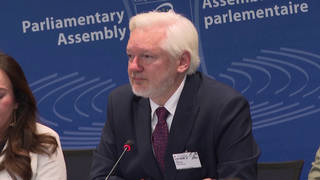
On Wednesday, WikiLeaks added more than half a million U.S. diplomatic cables from 1978 to its Public Library of US Diplomacy database. The documents include diplomatic cables and other diplomatic communications from and to U.S. embassies and missions in nearly every country. “1978 actually set in progress many of the geopolitical elements that are playing out today,” Assange said. “1978 was the beginning of the Iranian revolution … the Sandinista movement started in its popular form … the war period in Afghanistan began in 1978 and hasn’t stopped since.”
Transcript
AMY GOODMAN: We return to our exclusive interview with WikiLeaks founder Julian Assange. I spoke to him inside the Ecuadorean Embassy on Memorial Day, where he’s taken refuge for the past almost three years. On Wednesday, WikiLeaks added more than a half a million U.S. diplomatic cables from 1978 to its Public Library of US Diplomacy database. The documents include diplomatic cables and other diplomatic communications from and to U.S. embassies and missions in nearly every country. I asked Julian Assange to talk about the significance of the documents.
JULIAN ASSANGE: The U.S. State Department cables. 1978 was a very interesting period. These cables have come through the State Department system, international archives. We have sucked them all out and put them into our system, where we now have more than two million cables in the collection, all indexed. So, 1978, a very interesting time period. We have deliberately released all 400,000 at once to everyone. So, no one’s had an opportunity to cherry-pick, and we haven’t done that, either. What we have done is identified broad areas which are very interesting.
For example, 1978 actually set in progress many of the regional elements, the geopolitical elements, that are playing out today. For example, 1978 was the beginning of the Iranian revolution. It wasn’t until 1979 that it succeeded, but the push against the Shah started in 1978, with demonstrations and killings in response. Similarly, Nicaragua in 1978, the Sandinista movement started in its popular form as a result of a killing of a newspaper editor and was complete within two years. Afghanistan, the war period in Afghanistan began in 1978 and hasn’t stopped since. It was—the Soviet-friendly government came in in 1978, the assassination of the previous president, the rival of Soviet special forces towards the end of the year.
1978 saw the Vietnamese invasion of Cambodia. And while you might think, “Oh, well, that just concerns Vietnam and Cambodia,” no, this is an important consequence of the Vietnam War and how Cambodia was used and became a Chinese and American proxy in relation to Vietnam. So China, the U.K., U.S. supported Cambodia against the Vietnamese. The Vietnamese prevailed, but the conflict also led to a finalization of what had started under Kissinger’s rapprochement with China—a decisive move to configure China against the Soviet Union and onto the U.S. side of the Cold War conflict. And this war with Vietnam is something that facilitated Brzezinski’s visit to China and the eventual normalization of relations which occurred shortly after.
AMY GOODMAN: When it comes to Afghanistan, Zbigniew Brzezinski, in an interview with a French newspaper, talked about the arming of the mujahideen, of Osama bin Laden and others, saying, “What’s a few riled-up Muslims?”
JULIAN ASSANGE: It was Brzezinski’s—the moment of history that Brzezinski is the proudest of is in fact Afghanistan and creating a Vietnam for the Soviet Union in Afghanistan by arming the mujahideen and bin Laden. And that—
AMY GOODMAN: So that the Soviets would have their own quagmire.
JULIAN ASSANGE: So the Soviets would have their own quagmire, which they did. And that started in 1978.












Media Options